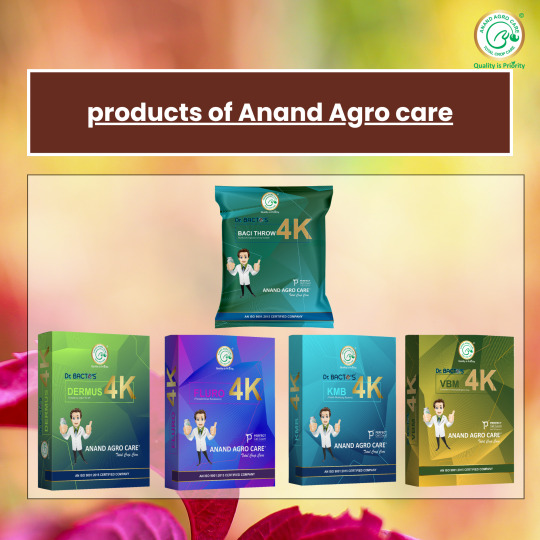#FertilizerOptimization
Explore tagged Tumblr posts
Text
Boost Your Crop's Potash Power Naturally with KMB Fertilizer.

In today’s agriculture, sustainable nutrient management is not just a choice—it’s a necessity. One of the most essential yet often underutilized nutrients is Potash (Potassium). It plays a vital role in improving plant strength, resistance, and yield. But did you know that a major portion of soil potash remains locked and unavailable to plants?
This is where KMB (Potash Mobilizing Bacteria) steps in — a revolutionary biofertilizer that unlocks soil-bound potassium and makes it plant-available naturally.
🧬 What is KMB?
KMB (Potash Mobilizing Bacteria) is a soil-friendly microbe that converts insoluble forms of potash into forms that plants can absorb easily. It is an efficient and eco-friendly solution to reduce dependency on chemical potash fertilizers.
🌱 Benefits of KMB Fertilizer:
✅ Mobilizes potash from soil minerals
✅ Enhances root strength and plant immunity
✅ Promotes fruit development and sugar transport
✅ Improves drought resistance and overall yield
✅ Safe for soil and promotes microbial diversity
By improving potassium uptake, KMB fertilizer directly contributes to crop health and productivity — especially in potassium-deficient soils.
🛠️ How to Use KMB Biofertilizer:
Soil Application: Mix 1–2 kg with compost/FYM and apply near the root zone.
Drip Irrigation: Use liquid KMB variant at recommended dilution.
Seed Treatment: Mix with water and coat seeds before sowing.
Apply during early growth stages or at flowering for best results.
🌾 Anand Agro Care’s Trusted KMB Solutions
At Anand Agro Care, we offer high-quality KMB biofertilizers under the trusted Dr. Bacto’s brand line. These products are developed using advanced microbial technology to ensure high colony counts and shelf life.
✅ Ideal for crops like sugarcane, cotton, vegetables, banana, pomegranate, and more.
🔗 Explore Now: KMB Fertilizer Products – Anand Agro Care
🌍 Sustainable Farming with Smart Nutrition
If you're looking to reduce your input costs while boosting yields and soil health, Potash Solubilizing Bacteria like KMB is the way forward. It’s time to let nature do the work for you!
📦 Ready to switch to natural potash mobilization? 👉 Shop KMB Fertilizers at Anand Agro Care
#organicfarming#agriculturalsoiltesting#agriculture#soilfertility#soilhealth#fertilizeroptimization#agritech
0 notes
Text
Best Bio Fungicides for Plants: Natural Protection with Powerful Results
In the world of sustainable farming and home gardening, plant health is key to a successful harvest. Among the most effective tools for protecting your crops and garden plants are bio fungicides – a natural, eco-friendly alternative to chemical treatments. If you're searching for the best fungicide for plants, you've come to the right place.
At Anand Agro Care, we offer a specialized range of bio-fungicides designed to combat plant diseases while nurturing the soil and maintaining ecological balance.

🌱 What is a Bio Fungicide?
Bio fungicides are formulations of beneficial microorganisms like bacteria and fungi that suppress harmful plant pathogens. Unlike chemical fungicides, these eco-friendly solutions do not harm the environment, pollinators, or humans.
💡 Why Choose Bio Fungicides?

Whether you're a farmer or a home gardener, choosing fungicides for plants that are biological in nature can make a huge difference in plant health and yield.
🔍 Best Fungicide for Plants: Our Top Picks
Explore our curated range of bio fungicides including:
Dr. Bacto’s Tricho – Contains Trichoderma viride, an effective antagonist against soil-borne pathogens.
Dr. Bacto’s BioCure-F – A powerful Pseudomonas fluorescens formulation that controls root rot and wilt.
Dr. Bacto’s BioCure-B – Excellent for foliar applications, fighting leaf spot and mildew diseases.
Each of these fungicide powder for plants is easy to apply and safe for all stages of plant growth.
🛠 How to Use Fungicide Powder for Plants
Mix recommended quantity with water (as per label instructions).
Apply as foliar spray or soil drench.
Repeat treatment every 7–14 days for best results.
Use during early morning or late evening for better absorption.
🌍 Eco-Conscious Plant Protection Starts Here
With increasing awareness about environmental safety, more and more farmers are shifting to biological solutions. Fungicides for plants from Anand Agro Care not only protect your crops but also improve soil health and biodiversity.
Start your journey toward sustainable agriculture with our range of bio-fungicides.

Ready to protect your plants naturally? Visit 👉 Anand Agro Care Bio Fungicides to shop now.
0 notes
Text
Why Chelated Micronutrients Are Essential for Healthy Crops

In modern agriculture, balanced nutrition plays a critical role in ensuring high crop productivity and plant health. Among all nutrients, Chelated micronutrients stand out due to their efficiency in nutrient delivery and absorption.
🔹 What Are Chelated Micronutrients?
Micronutrients such as zinc (Zn), iron (Fe), manganese (Mn), copper (Cu), etc., are required in small quantities but are essential for:
Enzyme function
Chlorophyll production
Root development
Disease resistance
However, in many soils, these nutrients become unavailable to the plant due to soil pH and chemical reactions. That’s where chelation comes in.
🔹 Role of EDTA in Chelation
EDTA chelated micronutrients are micronutrients bound with EDTA (Ethylenediaminetetraacetic acid), which:
Protects nutrients from soil fixation.
Keeps nutrients soluble and plant-available.
Ensures quick absorption via roots or foliar application.
Explore our full range of EDTA Chelated Micronutrients here.
🔹 Benefits of Chelated Micronutrients in Farming
✅ Faster correction of deficiencies ✅ Higher nutrient use efficiency ✅ Suitable for drip, foliar, and soil applications ✅ Improves crop growth, yield, and quality ✅ Cost-effective long-term solution
🔹 Why Choose Anand Agro Care?
At Anand Agro Care, we offer a specialized range of EDTA Chelated Micronutrients tailored for Indian soils and crops. Our products are:
100% water-soluble
Compatible with other fertilizers
Field-tested by thousands of farmers
Whether you’re growing vegetables, fruits, cereals, or cash crops, our micronutrients support better plant health and yield.
👉 Ready to Boost Your Crop Nutrition?
Visit our EDTA Chelated Micronutrient Product Page to explore products, usage instructions, and farmer reviews.
#soiltesting#organicfarming#soilfertility#agriculture#ecofriendlyfarming#fertilizeroptimization#agritech
0 notes
Text
Why Chelated Micronutrients Are Essential for Healthy Crops

Here's a brief SEO blog based on the analysis of the keywords: “Chelated micronutrients”, “EDTA chelated micronutrients”, for the Aand Agro Care EDTA Chelated Micronutrient product category.
🌱 Why Chelated Micronutrients Are Essential for Healthy Crops
In modern agriculture, balanced nutrition plays a critical role in ensuring high crop productivity and plant health. Among all nutrients, Chelated micronutrients stand out due to their efficiency in nutrient delivery and absorption.
🔹 What Are Chelated Micronutrients?
Micronutrients such as zinc (Zn), iron (Fe), manganese (Mn), copper (Cu), etc., are required in small quantities but are essential for:
Enzyme function
Chlorophyll production
Root development
Disease resistance
However, in many soils, these nutrients become unavailable to the plant due to soil pH and chemical reactions. That’s where chelation comes in.
🔹 Role of EDTA in Chelation
EDTA chelated micronutrients are micronutrients bound with EDTA (Ethylenediaminetetraacetic acid), which:
Protects nutrients from soil fixation.
Keeps nutrients soluble and plant-available.
Ensures quick absorption via roots or foliar application.
Explore our full range of EDTA Chelated Micronutrients here.
🔹 Benefits of Chelated Micronutrients in Farming
✅ Faster correction of deficiencies ✅ Higher nutrient use efficiency ✅ Suitable for drip, foliar, and soil applications ✅ Improves crop growth, yield, and quality ✅ Cost-effective long-term solution
🔹 Why Choose Anand Agro Care?
At Anand Agro Care, we offer a specialized range of EDTA Chelated Micronutrients tailored for Indian soils and crops. Our products are:
100% water-soluble
Compatible with other fertilizers
Field-tested by thousands of farmers
Whether you’re growing vegetables, fruits, cereals, or cash crops, our micronutrients support better plant health and yield.
👉 Ready to Boost Your Crop Nutrition?
Visit our EDTA Chelated Micronutrient Product Page to explore products, usage instructions, and farmer reviews.
Let me know if you'd like to add internal product links, a Marathi version, or optimize this for meta titles and descriptions.
#agriculturalsoiltesting#soiltesting#soilfertility#organicfarming#agritech#fertilizeroptimization#ecofriendlyfarming#smartfarming#agriculture
0 notes
Text

Unlocking Nature’s Potential with Plant Growth Promoters from Anand Agro Care
In the ever-evolving world of sustainable agriculture, Plant Growth Promoters (PGPs) have emerged as a game-changing solution for farmers and agronomists alike. These natural substances or microbial formulations help improve the physiological processes of plants, ensuring healthier growth, increased resistance to stress, and ultimately, higher yields. For farmers who prioritize eco-friendly practices and high productivity, Anand Agro Care stands out as a reliable partner offering an impressive range of plant growth promoters.
What are Plant Growth Promoters?
Plant Growth Promoters are organic or microbial products that stimulate plant growth by enhancing nutrient uptake, promoting root and shoot development, and improving photosynthesis. Unlike chemical growth regulators, these solutions are biodegradable and non-toxic, making them ideal for sustainable farming practices.
These bio-based inputs work either by producing plant hormones like auxins, gibberellins, and cytokinins or by facilitating better nutrient absorption from the soil.
Why Choose Anand Agro Care for Plant Growth Promoters?
Anand Agro Care is a pioneer in the field of bio-agriculture, known for its commitment to research-driven, eco-friendly, and cost-effective crop solutions. Their range of plant growth promoter products are specifically formulated to address the diverse needs of Indian soil and climate conditions.
Let’s explore some of their leading PGR products:
⭐ Anand Agro Care's Plant Growth Promoter Products:
Bio Clean Sweep A powerful microbial formulation that boosts root development and nutrient assimilation.
NutriGold Enriched with essential micronutrients and plant hormones that help in enhancing flowering and fruiting.
Microbial Consortium PGP A blend of beneficial microbes that not only promote growth but also improve soil health and fertility.
Fulvic Acid An excellent chelating agent that helps in faster nutrient uptake and better growth of crops.
Amino Acid Supplies the essential building blocks for protein synthesis in plants, leading to robust and healthy growth.
Zyme Liquid A plant tonic made from seaweed extract, rich in natural hormones and trace elements that stimulate overall plant vigor.
Benefits of Using Plant Growth Promoters
Enhanced Root Development: Deeper, stronger root systems for better nutrient and water absorption.
Increased Yield: More fruits, better quality produce, and higher market value.
Eco-Friendly: Safe for the environment and reduces chemical load on crops.
Stress Resistance: Helps plants combat drought, salinity, and disease stress.
Improved Soil Health: Supports microbial activity and enriches the soil ecosystem.
Boost Your Crop Productivity Today
If you’re seeking a natural, effective, and eco-conscious way to improve your crop yield and quality, look no further than Anand Agro Care’s Plant Growth Promoter solutions. Whether you're cultivating cereals, vegetables, fruits, or pulses, their innovative products cater to every crop’s growth needs.
Take the first step towards healthier crops and sustainable farming—Explore Anand Agro Care’s PGR range now!
#organicfarming#soilhealth#smartfarming#soiltesting#soilfertility#agriculture#fertilizeroptimization
0 notes
Text
What Is Biofertilizer and Why Should We Use It?

In today's agriculture, where soil degradation and chemical overuse are major concerns, biofertilizers offer a powerful, natural solution. These eco-friendly inputs improve soil fertility, promote plant growth, and are key to sustainable farming. But what exactly are biofertilizers, and why are they important?
Let’s explore their definition, benefits, and some of the best options available at Anand Mart—your trusted source for natural agri-inputs.
🌿 What Is Biofertilizer?
A biofertilizer is a substance that contains living microorganisms, which, when applied to seeds, soil, or plant surfaces, enhance the plant’s growth by increasing the supply or availability of primary nutrients.
These natural fertilizers work by:
Fixing atmospheric nitrogen
Solubilizing soil phosphorus
Stimulating plant hormone production
Improving soil microbial activity
Instead of adding synthetic nutrients, bio-fertilizers from Anand Mart help plants absorb nutrients more efficiently and enrich soil health over time.
🌾 Why Should Farmers Use Biofertilizers?
Modern agriculture demands sustainability—and biofertilizers provide exactly that. Here’s why more and more farmers are shifting to bio-based inputs:
✅ Improves soil structure and fertility
✅ Boosts crop yield naturally
✅ Reduces dependence on chemical fertilizers
✅ Safe for the environment, humans, and animals
✅ Cost-effective and long-term benefits
If you're looking to reduce your input costs and grow healthier crops, it's time to switch to natural farming with biofertilizers.
🧪 Biofertilizers Available at Anand Mart
At Anand Mart, we offer a wide variety of high-quality, research-based biofertilizer products that cater to all crop types and soil conditions. These products are manufactured with advanced microbial strains and proven formulations.
Some of our top-selling biofertilizers include:
🔹 Azotobacter Biofertilizer
Helps in nitrogen fixation, promoting healthy root development and vegetative growth.
🔹 Phosphate Solubilizing Bacteria (PSB)
Improves phosphorus availability in the soil, crucial for flowering and fruiting.
🔹 Potash Mobilizing Bacteria (KMB)
Increases potash uptake, enhancing overall plant health and stress resistance.
🔹 Zinc Solubilizing Bacteria (ZSB)
Addresses zinc deficiency and boosts enzyme activity in plants.
Explore our full range of biofertilizers to choose the right solution for your crop.
🌱 How to Use Biofertilizers Effectively
Biofertilizers can be applied in several ways:
Seed treatment before sowing
Soil application during land preparation
Drip irrigation or foliar spray
Each method depends on the crop, soil type, and product. For best results, follow the usage instructions on each product detail page.
✅ Why Buy Biofertilizers from Anand Mart?
🔬 Lab-tested microbial quality
🌾 Ideal for Indian crops and climates
🚚 Doorstep delivery across India
🛒 Easy online ordering at anandmart.in
We’re committed to providing high-performance inputs for farmers who care about soil health and sustainable agriculture.
🌍 Final Thoughts
Using biofertilizers is not just a farming decision—it’s an investment in your land's long-term fertility and the planet’s future. Whether you grow cereals, pulses, fruits, or vegetables, there's a biofertilizer at Anand Mart that can improve your yield and protect your soil.
👉 Ready to farm smarter and greener? Explore and shop our complete biofertilizer collection here.
#agriculturalsoiltesting#organicfarming#soilfertility#ecofriendlyfarming#fertilizeroptimization#soiltesting
0 notes
Text
Understanding Fertilizer Analysis: Why It Matters for Sustainable Farming
Fertilizer plays a crucial role in modern agriculture, ensuring that crops receive the essential nutrients needed for healthy growth. However, excessive or improper use of fertilizers can lead to nutrient imbalances, soil degradation, and environmental harm. This is where fertilizer analysis becomes essential.
What is Fertilizer Analysis?
Fertilizer analysis is the process of determining the nutrient composition of fertilizers to ensure they meet specific agricultural requirements. This analysis helps farmers and agronomists understand the levels of essential macronutrients (Nitrogen, Phosphorus, and Potassium) and micronutrients present in a given fertilizer sample.
By conducting a detailed evaluation in a fertilizer analysis lab, farmers can make informed decisions about nutrient application, preventing over-fertilization or nutrient deficiencies in their soil.
How Accurate Testing Optimizes Nutrient Application
Precise fertilizer analysis laboratory testing is crucial for optimizing agricultural productivity. Here's how accurate testing benefits farmers:
Improves Soil Health: Regular testing ensures that fertilizers contain the right balance of nutrients, preventing long-term soil degradation.
Prevents Over-Fertilization: Excessive fertilizer use can lead to nutrient runoff, water pollution, and increased costs. Analysis helps farmers apply only what is necessary.
Enhances Crop Yields: Proper nutrient balance ensures healthier crops, leading to improved yields and higher profitability.
Reduces Environmental Impact: Precision in fertilizer application minimizes soil and water contamination, promoting sustainable farming practices.
The Role of Anand Biochem in Ensuring Soil and Crop Health
At Anand Biochem, we specialize in providing comprehensive fertilizer analysis services. As a NABL-accredited research and development center, we utilize advanced technologies such as HPLC, GC, ICP-OES, and AAS to deliver accurate and reliable results.
Our team of experts not only conducts detailed testing but also provides actionable recommendations based on the results. By offering farmers precise insights, we help them make data-driven decisions that enhance soil fertility, optimize fertilizer use, and promote sustainable agriculture.
Conclusion
Fertilizer analysis is a critical tool for modern farming, ensuring that crops receive the right nutrients while minimizing environmental impact. With the support of a trusted fertilizer analysis lab like Anand Biochem, farmers can optimize their fertilizer use, improve crop yields, and contribute to sustainable agricultural practices.
For more information about our fertilizer analysis laboratory services, visit Anand Biochem today.

0 notes
Text
The Importance of Soil Testing in Modern Agriculture
Soil testing is an essential scientific process that evaluates the chemical, physical, and biological properties of soil. It provides crucial insights into soil health, enabling farmers to optimise fertilisation, improve crop yields, and implement sustainable agricultural practices. By analysing soil samples, farmers can make informed decisions that enhance productivity while reducing environmental impact.
What is Soil Testing?
Soil testing involves collecting soil samples from various locations in a field and analysing them for key characteristics such as nutrient levels, pH, organic matter content, texture, and the presence of contaminants. This process helps farmers understand their soil’s fertility, allowing them to apply precise amendments and avoid unnecessary chemical inputs.
Tools Required for Soil Testing
To conduct effective agricultural soil testing, the following tools are essential:
Clean Plastic Bags/Ghamela
Farm Map
Soil Test Probe
Spade, Shovel, Hoe
Sample Submission Form
Test Sample
Advantages of Soil Testing
Identifies Nutrient Deficiencies – Helps determine the exact nutrient needs of the soil, enabling targeted fertiliser application.
Optimises Soil pH – Ensures the soil pH is within the ideal range for maximum nutrient uptake and plant growth.
Enhances Crop Yields – Provides specific recommendations for soil amendments to improve productivity.
Prevents Overuse of Fertilisers – Reduces environmental impact and input costs.
Aids in Sustainable Soil Management – Ensures long-term soil fertility and health.
Precautions to Take During Soil Testing
Proper Sampling – Collect samples from different parts of the field to ensure a representative sample.
Use Clean Tools – Prevent contamination by using non-reactive tools like plastic or stainless steel.
Sample Depth – Typically, samples should be taken 6-8 inches deep, depending on crop requirements.
Maintain Consistency – Use the same method for sampling over time to track soil health changes.
Document Everything – Label samples with date, location, and depth for accurate record-keeping.
Why is Soil Testing Important?
1. Optimising Nutrient Management
Soil analysis determines current nutrient levels, allowing precise fertiliser application to prevent deficiencies and excesses.
2. Enhancing Crop Yield
By understanding soil characteristics, farmers can make informed choices about crop selection, planting methods, and irrigation strategies.
3. Improving Soil Health
Regular testing helps maintain the balance of organic matter, nutrients, and pH levels, contributing to long-term soil fertility.
4. Preventing Environmental Degradation
By avoiding excessive fertilisation, soil testing mitigates nutrient runoff, soil erosion, and groundwater contamination.
5. Customising Fertiliser Programs
Soil testing methods allow farmers to tailor fertiliser formulations according to soil needs, ensuring maximum efficiency and minimal waste.
6. Detecting Soil Contaminants
Tests can identify harmful substances such as heavy metals, pesticides, or pollutants, helping farmers take corrective measures.
7. Supporting Sustainable Agriculture
By guiding sustainable soil management, soil testing plays a key role in preserving soil productivity for future generations.
8. Reducing Input Costs
Precise nutrient assessment prevents the over-application of fertilisers, thereby lowering costs while maintaining crop health.
9. Facilitating Precision Agriculture
Soil testing laboratories provide data that can be integrated into precision agriculture technologies, optimising resource use and improving efficiency.
10. Ensuring Food Safety
Testing ensures that crops are grown in healthy, nutrient-rich soil, supporting the production of safe and nutritious food.
Common Soil Testing Methods
CBR Test of Soil – Used to determine the soil’s strength for road and pavement construction.
Soil Compaction Test – Measures the density of soil to assess its ability to support structures.
Soil Testing Lab – Professional testing facilities offer in-depth analysis for different agricultural and construction needs.
Soil Testing Lab Near Me – Farmers can locate local labs for convenient soil analysis.
Conclusion
Soil testing is a fundamental practice for maintaining soil health, optimising crop production, and promoting sustainable agriculture. By conducting regular soil analysis, farmers can improve productivity while ensuring environmental protection. Whether you’re looking for a soil testing laboratory or need guidance on soil testing methods, investing in soil health today will secure a prosperous agricultural future.
#agriculturalsoiltesting#soiltesting#agritech#farmmanagement#ecofriendlyfarming#fertilizeroptimization#organicfarming#smartfarming#soilfertility#precisionagriculture
0 notes
Text
The Importance of Soil Testing in Modern Agriculture
Soil testing is an essential scientific process that evaluates the chemical, physical, and biological properties of soil. It provides crucial insights into soil health, enabling farmers to optimise fertilisation, improve crop yields, and implement sustainable agricultural practices. By analysing soil samples, farmers can make informed decisions that enhance productivity while reducing environmental impact.
What is Soil Testing?
Soil testing involves collecting soil samples from various locations in a field and analysing them for key characteristics such as nutrient levels, pH, organic matter content, texture, and the presence of contaminants. This process helps farmers understand their soil’s fertility, allowing them to apply precise amendments and avoid unnecessary chemical inputs.
Tools Required for Soil Testing
To conduct effective agricultural soil testing, the following tools are essential:
Clean Plastic Bags/Ghamela
Farm Map
Soil Test Probe
Spade, Shovel, Hoe
Sample Submission Form
Test Sample
Advantages of Soil Testing
Identifies Nutrient Deficiencies – Helps determine the exact nutrient needs of the soil, enabling targeted fertiliser application.
Optimises Soil pH – Ensures the soil pH is within the ideal range for maximum nutrient uptake and plant growth.
Enhances Crop Yields – Provides specific recommendations for soil amendments to improve productivity.
Prevents Overuse of Fertilisers – Reduces environmental impact and input costs.
Aids in Sustainable Soil Management – Ensures long-term soil fertility and health.
Precautions to Take During Soil Testing
Proper Sampling – Collect samples from different parts of the field to ensure a representative sample.
Use Clean Tools – Prevent contamination by using non-reactive tools like plastic or stainless steel.
Sample Depth – Typically, samples should be taken 6-8 inches deep, depending on crop requirements.
Maintain Consistency – Use the same method for sampling over time to track soil health changes.
Document Everything – Label samples with date, location, and depth for accurate record-keeping.
Why is Soil Testing Important?
1. Optimising Nutrient Management
Soil analysis determines current nutrient levels, allowing precise fertiliser application to prevent deficiencies and excesses.
2. Enhancing Crop Yield
By understanding soil characteristics, farmers can make informed choices about crop selection, planting methods, and irrigation strategies.
3. Improving Soil Health
Regular testing helps maintain the balance of organic matter, nutrients, and pH levels, contributing to long-term soil fertility.
4. Preventing Environmental Degradation
By avoiding excessive fertilisation, soil testing mitigates nutrient runoff, soil erosion, and groundwater contamination.
5. Customising Fertiliser Programs
Soil testing methods allow farmers to tailor fertiliser formulations according to soil needs, ensuring maximum efficiency and minimal waste.
6. Detecting Soil Contaminants
Tests can identify harmful substances such as heavy metals, pesticides, or pollutants, helping farmers take corrective measures.
7. Supporting Sustainable Agriculture
By guiding sustainable soil management, soil testing plays a key role in preserving soil productivity for future generations.
8. Reducing Input Costs
Precise nutrient assessment prevents the over-application of fertilisers, thereby lowering costs while maintaining crop health.
9. Facilitating Precision Agriculture
Soil testing laboratories provide data that can be integrated into precision agriculture technologies, optimising resource use and improving efficiency.
10. Ensuring Food Safety
Testing ensures that crops are grown in healthy, nutrient-rich soil, supporting the production of safe and nutritious food.
Common Soil Testing Methods
CBR Test of Soil – Used to determine the soil’s strength for road and pavement construction.
Soil Compaction Test – Measures the density of soil to assess its ability to support structures.
Soil Testing Lab – Professional testing facilities offer in-depth analysis for different agricultural and construction needs.
Soil Testing Lab Near Me – Farmers can locate local labs for convenient soil analysis.
Conclusion
Soil testing is a fundamental practice for maintaining soil health, optimising crop production, and promoting sustainable agriculture. By conducting regular soil analysis, farmers can improve productivity while ensuring environmental protection. Whether you’re looking for a soil testing laboratory or need guidance on soil testing methods, investing in soil health today will secure a prosperous agricultural future.
#soiltesting#agriculturalsoiltesting#agritech#farmmanagement#ecofriendlyfarming#fertilizeroptimization#organicfarming#precisionagriculture#smartfarming#soilfertility
0 notes
Text
Unlocking the Power of Soil Testing for Better Agricultural Yields

In modern farming, achieving high crop productivity starts with understanding the foundation of all plant growth—the soil. Soil testing plays a crucial role in optimizing soil health, ensuring balanced nutrient levels, and enhancing agricultural sustainability.
Why is Soil Testing Important?
Soil analysis helps farmers and agronomists determine the nutrient composition, pH levels, and organic matter in the soil. This valuable data allows for precise fertilizer applications, reducing unnecessary costs and preventing environmental degradation caused by over-fertilization. Without proper agricultural soil testing, farmers may struggle with nutrient deficiencies or toxicities, leading to poor crop yields and financial losses.
Key Benefits of Soil Analysis
Improved Crop Yields – A well-balanced soil ensures healthy plant growth, leading to higher productivity.
Cost-Effective Farming – Optimized nutrient management reduces excess fertilizer use, saving money and resources.
Environmental Protection – Prevents soil degradation and leaching of harmful chemicals into water bodies.
Soil Health Monitoring – Regular testing helps track changes in soil composition over time.
Customized Fertilization Plans – Provides recommendations tailored to the specific needs of different crops and soil types.
The Process of Agricultural Soil Testing
Soil Sample Collection – Farmers collect soil samples from different locations in their fields.
Laboratory Analysis – Samples are tested for pH, nutrients, and organic matter content.
Report Interpretation – Experts provide recommendations based on test results.
Nutrient Management Plan – Farmers apply fertilizers and amendments as per the soil test report.
Take the Next Step Towards Healthy Soil
Regular soil testing is a game-changer for farmers looking to boost productivity and maintain soil fertility. If you want to optimize your land’s potential, consider professional soil analysis services to make informed farming decisions. Investing in agricultural soil testing today ensures a sustainable and profitable future in farming.
Stay ahead in agriculture—test your soil today!
#SoilTesting#SoilAnalysis#AgriculturalSoilTesting#FarmManagement#SustainableFarming#CropYield#SoilHealth#PrecisionAgriculture#OrganicFarming#FertilizerOptimization#HealthySoil#SmartFarming#AgTech#EcoFriendlyFarming#SustainableAgriculture
0 notes
Text
The Significance of Soil Testing in Modern Agriculture
Soil health is a critical factor in determining agricultural productivity. At Anand Biochem, we specialize in comprehensive soil testing services to assist farmers in making well-informed decisions for better crop yield and sustainable farming practices. By analyzing soil nutrients and composition, we help in optimizing fertilizer application and improving soil fertility.
Why Soil Analysis is Essential
Accurate soil analysis is vital for understanding the nutrient profile, pH levels, and organic matter content in the soil. Our NABL-accredited laboratory is equipped with state-of-the-art instruments like HPLC, GC, ICP-OES, and AAS to ensure precision in every test. By conducting thorough soil evaluations, we provide farmers with actionable insights to enhance agricultural productivity.
Agricultural Soil Testing for Sustainable Farming
Agricultural soil testing plays a significant role in sustainable farming. It helps identify soil deficiencies, preventing overuse of chemical fertilizers and promoting eco-friendly farming methods. Our expert team offers tailored recommendations based on test results, allowing farmers to maintain soil fertility while maximizing crop production.
Commitment to Excellence in Soil Testing
At Anand Biochem, we uphold the principle of “Quality in Every Test.” Our dedicated team works towards delivering reliable soil assessments, empowering farmers with the knowledge needed for better soil management. By leveraging advanced technology and scientific methodologies, we ensure the highest standards of accuracy and efficiency.
For top-tier soil testing services, partner with Anand Biochem. Contact us today and take the first step towards better soil health and enhanced agricultural productivity!

#SoilTesting#SoilAnalysis#AgriculturalSoilTesting#SustainableFarming#SoilHealth#PrecisionAgriculture#CropManagement#FertilizerOptimization#EcoFriendlyFarming#SoilFertility#SmartFarming#AgriTech#FarmersFirst#SustainableAgriculture
0 notes